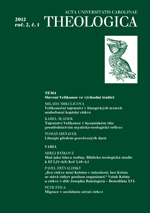Muž jako hlava rodiny. Biblicko-teologická studie k Ef 5,21–6,9; Kol 3,18–4,1
Man as the head of a household. Exegesis of Ephesians 5:21–6:9 and Colossians 3:18–4:1
Author(s): Mirej RyškováSubject(s): Christian Theology and Religion
Published by: Univerzita Karlova v Praze, Nakladatelství Karolinum
Keywords: Letter to Colossians; Letter to Ephesians; exegesis; household codes; biblical ethics
Summary/Abstract: The text is dealing with the so called household (status) codes (Haustafeln) especially in the Letters to Colossians and Ephesians. Both texts, parts of a more voluminous parenesis for the community of the church, are based on a scheme typical for that period of relations between man and woman, parents and children, and lords and slaves in a household. The Christian interpretation of that scheme in the Letters to Colossians and Ephesians brings a significant innovation, because it is based on a new understanding of man as renovated in Christ. Although the patriarchal order is maintained, still these relations are seen in a new way in which the decisive role is played by pointing to Jesus Christ and his relation to the church. In the Letter to Ephesians first of all the relation between man and women is elaborated and their unity is stressed. The example and at the same time the place of realisation of their relation is the relation between Christ and the church. This relation full of love, obedience and selfsacrifice from both sides ought to fill and represent the Christian marriage. The Letter to Colossians deals with the relation between the lords and the slaves. This relation is again made relative by pointing to Christ. A.significant moment is stressing the dignity of human work, because it is – irrespective of human evaluation – service to Christ himself. Also the relation between parents and children is seen as a partnership with duties from both sides. Beyond that, the letter to Ephesians stresses the duty of parents to educate in faith, to pass the values of life. These texts, though they are often understood as sanctification of patriarchal structures, in reality want to lead to responsible and effective family life in which everyone has his or her role and responsibility. This is the lasting message of these texts irrespective of the momentary social structures which are passing.
Journal: Acta Universitatis Carolinae Theologica
- Issue Year: II/2012
- Issue No: 1
- Page Range: 63-86
- Page Count: 24

